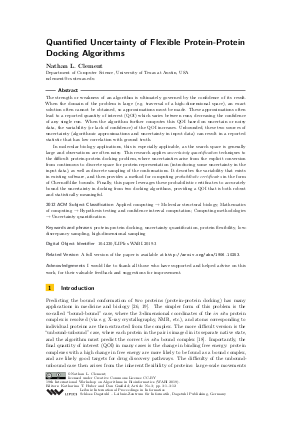LIPIcs.WABI.2019.3.pdf
- Filesize: 1.28 MB
- 12 pages

 Creative Commons Attribution 3.0 Unported license
Creative Commons Attribution 3.0 Unported license

The strength or weakness of an algorithm is ultimately governed by the confidence of its result. When the domain of the problem is large (e.g. traversal of a high-dimensional space), an exact solution often cannot be obtained, so approximations must be made. These approximations often lead to a reported quantity of interest (QOI) which varies between runs, decreasing the confidence of any single run. When the algorithm further computes this QOI based on uncertain or noisy data, the variability (or lack of confidence) of the QOI increases. Unbounded, these two sources of uncertainty (algorithmic approximations and uncertainty in input data) can result in a reported statistic that has low correlation with ground truth. In molecular biology applications, this is especially applicable, as the search space is generally large and observations are often noisy. This research applies uncertainty quantification techniques to the difficult protein-protein docking problem, where uncertainties arise from the explicit conversion from continuous to discrete space for protein representation (introducing some uncertainty in the input data), as well as discrete sampling of the conformations. It describes the variability that exists in existing software, and then provides a method for computing probabilistic certificates in the form of Chernoff-like bounds. Finally, this paper leverages these probabilistic certificates to accurately bound the uncertainty in docking from two docking algorithms, providing a QOI that is both robust and statistically meaningful.


























Feedback for Dagstuhl Publishing